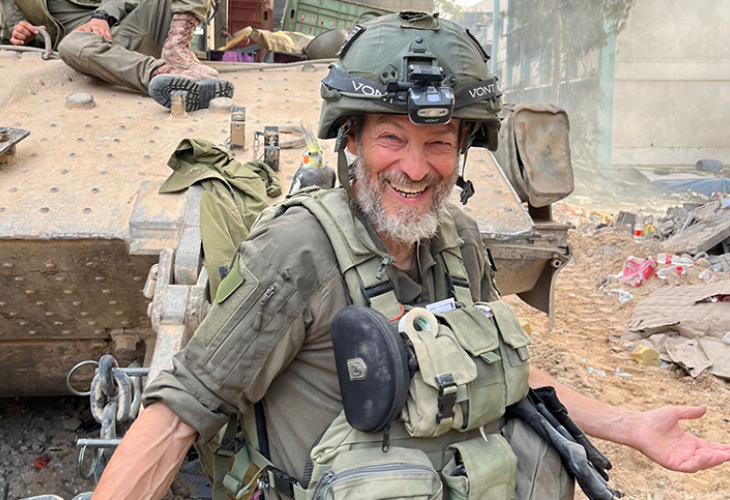From Healing to Heartbreak: A Journey Through Gaza
Dr. Sodi Namir never imagined his clinic would become a hotbed of terror, but that's what he discovered on the frontline in Gaza. An emotional interview from within the turmoil.

To reach Professor Sodi Namir, I had to wake up at odd hours, send him a message early in the morning when most people are still shaking off sleep, and wait with anticipation for hours for his call. Namir, the renowned doctor from Gush Katif, has been serving in the reserves for many months. Having experienced the trauma of the Gush evacuation, he has plans and dreams of dismantling the Gaza Strip and re-establishing Jewish settlements, but these days, he is mainly occupied with saving the lives of soldiers injured in the battles in the area.
Namir, 65, a former resident of Neve Dekalim, doesn't hold back his criticism of the Israeli government's decision, under Ariel Sharon, to implement the disengagement plan and evacuate Gush Katif of its Jewish settlers. "Gush Katif was the ideal place to blend the Torah of Israel with the land of Israel," he says longingly. "But unfortunately, the state chose to evacuate Gaza, a foolish decision that unleashed terrorism. We witnessed the devastating results in the last war."
"The Horrific Scenes Have Not Left Me Yet"
Where were you when you heard about the war breaking out?
"That Shabbat, I was visiting the community of Alfei Menashe in Samaria," Namir recalls the day of the Simchat Torah outbreak. "I prayed at dawn, and on the way home, I saw residents getting into cars quickly. Most of the community adheres to Jewish law and certainly doesn't drive on Shabbat, and I started to realize something terrible must have happened."
Namir hastened home. He turned on his phone and received an immediate summons to report to the base of the Fire Arrows Brigade (Brigade 551), composed of reserve commando soldiers. "Once we arrived at the base at the Bilu Junction, we geared up, and at the end of Shabbat, we boarded Hummers and headed south. The medical units that went ahead of us had already treated most of the injured, and we joined forces and continued the care."
Despite the shocking scenes, Namir was exposed to even harsher horrors the next morning. "It was a sweltering day, and the commander approached us requesting assistance in evacuating bodies. He stressed it wasn't our official role, but no one else was available. Along the road from Sderot to Gaza lay corpses, some entirely burnt. We undertook the grim task of evacuating the bodies under fire, as rockets rained down, surrounded by leftover terrorists lurking by the road."
"My heart broke at the sight of the horribly mutilated bodies. The scenes I saw are indescribable. It was a profoundly nightmarish day. As night fell, a mental health officer arrived at the base, aiming to boost morale."
"Standing on the Roof, Tears Ran Down My Face"
During operations in the strip, Namir and the soldiers reached the area where Neve Dekalim once stood. He discovered that an Arab hospital, complete with surgical rooms, maternity wards, and even a geriatric unit, had replaced the settlement's yeshiva.
"Next to the neighborhood where we lived stood a high-rise, and with the Givati unit I accompanied, we cleared the building," Namir reports from the battle. "A few moments later, I climbed onto the roof and was stunned by the extent of the devastation. The Arabs had erased the entire residential area and built themselves lavish residential infrastructure across the region."
A further shock awaited Namir just around the corner, as he stood tearfully before his own clinic, transformed into an Arab university. "Their universities are actually centers for Hamas terrorism," he says with pain. "They cultivate new generations of terrorists, raised on ideal education towards acts of terror and violence."
"I Couldn't Miss the Opportunity"
The interview with Professor Namir is conducted amidst intense military activities. In his role as a military emergency physician, he participated in ground maneuvers within Gaza and saved many soldiers' lives. When I ask him where his strength comes from to engage in such grueling combat at his relatively advanced age, he attributes it firstly to faith in Hashem. "This is indeed a challenging war, where we are often exposed to harsh sights that require very strong faith to cope," he states. "Moreover, the willpower to help protect our homeland conquers all difficulties and obstacles."
"When the war erupted, I felt a deep obligation to seize the opportunity and partake in the right to fight for our homeland," he shares at the end. "I couldn't afford to miss the chance to fight for our land, and from this sense, I entered the war."

